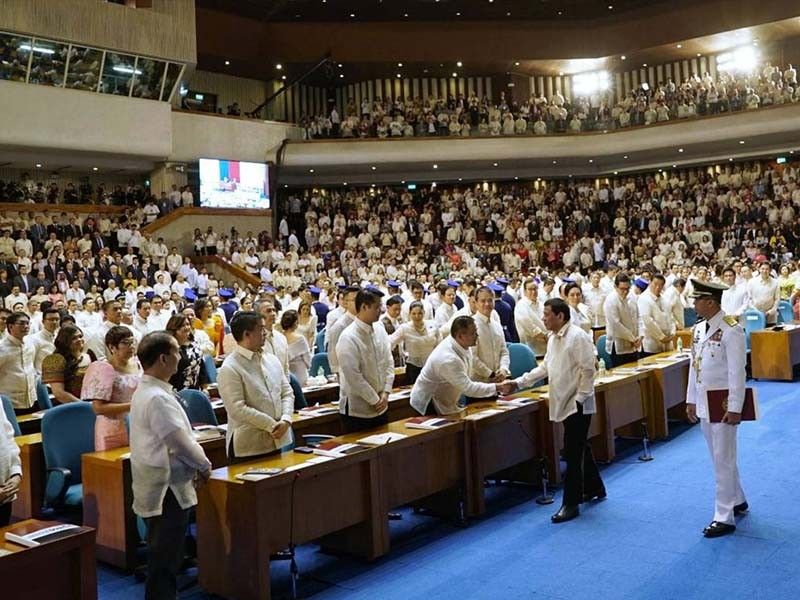Gov’t agencies, legal luminaries: Senate, House must vote on charter change separately

MANILA, Philippines — The justice department, the interior department, former Supreme Court justices and Framers of the Constitution on Wednesday all agreed that the upper and lower chambers of Congress must vote separately on amending the charter.
This consensus disputes the position of some lawmakers in the House of Representatives that voting may be done jointly and affirms the general position of the Senate, whose 24 members, in a joint vote setup, would be severely outnumbered by the hundreds of lawmakers in the lower house.
Former Supreme Court Justice Vicente Mendoza and Constitutional Framers Christian Monsod and Adolfo Azcuna all agreed during a Senate hearing on charter change that the upper and lower chambers of Congress should meet jointly as a constituent assembly but vote separately.
The Department of Justice and the Department of Interior and Local Government, both of which back the effort to liberalize economic provisions in the Constitution, were of the same opinion.
'Oversight' in the Amendment Clause
Article XVII, Section 1, of the 1987 Constitution which states that any amendment of revision may be proposed by Congress "upon a vote of three-fourths of all its Members" has been cited by lawmakers as the basis for a joint vote.
But Mendoza noted that the Amendment Clause "was originally designed for a unicameral National Assembly," and it was "only through oversight" that the Constitutional Commission failed to reflect their decision to have a bicameral Congress instead.
He cited other provisions in the charter that tackle the declaration of war, the canvassing of votes for the president and vice president, to revoke the president's declaration of martial law, and more, which require the two legislative chambers to meet in joint session but vote separately.
"If Congress is required to meet in joint session but to vote separately in performing the functions just enumerated, it stands to reason it must also be required to do the same when performing its highest function of amending or revising the fundamental law," Mendoza said.
Asked by Senate Minority Leader Franklin Drilon if the opinion of the justice department was the official stance of the entire executive branch, DOJ Chief State Counsel George Ortha II said he could not confirm this. Ortha added, however, that the opinion is also held by Secretary Justice Menardo Guevarra.
Drilon noted that Guevarra's opinion, as the lawyer of the Philippine government, is binding on the executive branch.
Azcuna backs charter change but cautions against changing its 'bedrock principles'
While Monsod and Mendoza opposed the latest push for charter change, Azcuna, who is also a former SC justice, said it was "high time to address the economic provisions of the Constitution, precisely because of the negative impact of the pandemic on the economy."
Although he said he would "leave the timeline to Congress," Azcuna added that trying to "to solve the economic impact of the pandemic without addressing the restrictive provisions of the Constitution, [would be] like fighting with one hand tied behind your back."
Azcuna cautioned, however, that only the economic provisions should be changed, "not the bedrock principles that protect the state's patrimony and resources."
Resolution of Both Houses No. 2, filed by House Speaker Lord Allan Velasco seeking to convene Congress as the constituent assembly to amend Articles XII, XIV, and XVI of the Constitution by adding the phrase "unless otherwise provided by law."
These articles tackle production-sharing agreements of natural resources, ownership of agricultural lands, certain areas of investment, operation of public utility, ownership, control, and administration of educational institutions, media ownership, and the advertising industry.
Azcuna noted, however, that upon reviewing the resolution, there were several instances where he found the phrase "unless otherwise provided by law" to be misplaced.
The DOJ, in its own position paper, wrote: "The constitutionally prescribed process of legislation constitutes safeguards to ensure that the extent of leniency that may be extended to foreign investment will remain protective of the national interest."
But Mendoza, who believes the current push for charter change to be ill-timed, does not see such safeguards. A runaway constituent assembly, he said, cannot be stopped from discussing issues apart from economic provisions.
Monsod, who is also a former commissioner of the Commission on Elections, slammed the charter change push a little over a year before elections, saying its "real motive, just like previous attempts, is power and money."
- Latest
- Trending


































